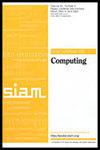Consensus-Halving: Does It Ever Get Easier?
IF 1.6
3区 计算机科学
Q3 COMPUTER SCIENCE, THEORY & METHODS
引用次数: 1
Abstract
In the $\varepsilon$-Consensus-Halving problem, a fundamental problem in fair division, there are $n$ agents with valuations over the interval $[0,1]$, and the goal is to divide the interval into pieces and assign a label "$+$" or "$-$" to each piece, such that every agent values the total amount of "$+$" and the total amount of "$-$" almost equally. The problem was recently proven by Filos-Ratsikas and Goldberg [2019] to be the first "natural" complete problem for the computational class PPA, answering a decade-old open question. In this paper, we examine the extent to which the problem becomes easy to solve, if one restricts the class of valuation functions. To this end, we provide the following contributions. First, we obtain a strengthening of the PPA-hardness result of [Filos-Ratsikas and Goldberg, 2019], to the case when agents have piecewise uniform valuations with only two blocks. We obtain this result via a new reduction, which is in fact conceptually much simpler than the corresponding one in [Filos-Ratsikas and Goldberg, 2019]. Then, we consider the case of single-block (uniform) valuations and provide a parameterized polynomial time algorithm for solving $\varepsilon$-Consensus-Halving for any $\varepsilon$, as well as a polynomial-time algorithm for $\varepsilon=1/2$. Finally, an important application of our new techniques is the first hardness result for a generalization of Consensus-Halving, the Consensus-$1/k$-Division problem [Simmons and Su, 2003]. In particular, we prove that $\varepsilon$-Consensus-$1/3$-Division is PPAD-hard.共识减半:它会变得更容易吗?
在公平分割的基本问题——varepsilon - consensus - halving问题中,有n个智能体在区间$[0,1]$上赋值,目标是将区间划分为若干块,并为每个块分配一个“$+$”或“$-$”的标签,使得每个智能体对“$+$”和“$-$”的总值几乎相等。最近,Filos-Ratsikas和Goldberg[2019]证明了这个问题是计算类PPA的第一个“自然”完整问题,回答了一个十年来的开放问题。在本文中,我们研究了在多大程度上,如果一个人限制了估值函数的类别,这个问题变得容易解决。为此,我们提供以下贡献。首先,我们得到了[Filos-Ratsikas and Goldberg, 2019]的ppa -硬度结果的强化,以处理只有两个区块的代理具有分段统一估值的情况。我们通过新的约简得到了这个结果,实际上在概念上比[Filos-Ratsikas and Goldberg, 2019]中的相应结果简单得多。然后,我们考虑了单块(统一)估值的情况,并提供了一个参数化的多项式时间算法来求解任意$\varepsilon$-Consensus-Halving,以及$\varepsilon=1/2$的多项式时间算法。最后,我们新技术的一个重要应用是Consensus- halving的推广的第一个硬度结果,即Consensus- 1/k$- division问题[Simmons and Su, 2003]。特别是,我们证明了$\varepsilon$- consensus -$1/3$- division是PPAD-hard的。
本文章由计算机程序翻译,如有差异,请以英文原文为准。
求助全文
约1分钟内获得全文
求助全文
来源期刊

SIAM Journal on Computing
工程技术-计算机:理论方法
CiteScore
4.60
自引率
0.00%
发文量
68
审稿时长
6-12 weeks
期刊介绍:
The SIAM Journal on Computing aims to provide coverage of the most significant work going on in the mathematical and formal aspects of computer science and nonnumerical computing. Submissions must be clearly written and make a significant technical contribution. Topics include but are not limited to analysis and design of algorithms, algorithmic game theory, data structures, computational complexity, computational algebra, computational aspects of combinatorics and graph theory, computational biology, computational geometry, computational robotics, the mathematical aspects of programming languages, artificial intelligence, computational learning, databases, information retrieval, cryptography, networks, distributed computing, parallel algorithms, and computer architecture.
 求助内容:
求助内容: 应助结果提醒方式:
应助结果提醒方式:


